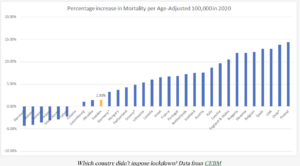“The crew at the Oxford Centre for Evidence-Based Medicine (CEBM) have done an analysis of excess mortality for 2020 across 32 countries to get a clearer picture of the impact of the pandemic and lockdowns. They used excess mortality instead of “Covid deaths”, they explain, to avoid problems with recording and classification of deaths and include any impact of anti-Covid measures. They used age-adjusted mortality to take into account differences in the average age of populations. They compared 2020’s figures to the average of the previous five years to give a percentage increase or excess during the pandemic year (they have made the tool they used to analyse the data publicly available).” – More here.
And here’s a screenshot of the data:

My favorite example occurred while cruising a freeway at 75 miles per hour. I noticed a blue Honda Accord in my rear-view mirror, driving erratically. The Accord narrowly missed cars as it cut in front of them, careened across two lanes of traffic, and blew past me at about 90 miles per hour. The driver cut in front of me, missing by just a few feet as it lurched back to its original lane and vanished into the other traffic. The reckless driver, alone in his car, was wearing a mask.
Absent government restrictions, we would surely observe coffee shops catering to all of these groups. Some would operate with fewer or even no extra safety procedures. They may not require masks at all, or they may operate at full capacity. Customers who take Covid-19 lightly would prefer this more relaxed atmosphere. If too few people are comfortable with this level of safety, then the shop would have to institute more stringent sanitization procedures, or else the lack of customers would force it out of business.
Sinéad Murphy decries the rises of the expertocracy. A slice:
Expertise in any domain is eventually purchased at a price. Though often seeded in genuine commitment to better understanding and practices, once past a certain threshold it becomes counterproductive. It loses sight of the bigger picture that lies beyond its field and excludes contingent factors that fall outside its frame.
But when expertise is plied in directly human domains – of care and education, for instance – the threshold beyond which it becomes counterproductive is very low and the price that is paid is very high. For, what makes us human is the bigger picture of our background and circumstances. What makes us human are the contingencies of our character and abilities.
Expertise, even when it is aimed at noble human causes like those of care and education, is an inherently impersonal enterprise. Though it may begin in human sympathy, its pursuit of finer and finer distinctions and of bigger and bigger efficiencies leads it to end in inhuman indifference.
Here’s Phil Magness on Fauci’s latest ejaculation of Covid ‘advice’: “He. Is. Making. It. Up. As. He. Goes.”
From the Cafe Hayek comments section:
Michael Wolf writes-
The biggest knock against those who denounce Sweden is that, according to them, Sweden should be nothing less than a disaster zone. The whole case for lockdowns – the honest one – isn’t that they marginally help. It’s that they’re worth the MASSIVE devastation and destruction because without them, there’d be bodies stacked in the streets. If Sweden isn’t by far the worst performing country on the planet – and it isn’t even close to the worst – then their whole case crumbles. They obfuscate this by myopically focusing solely on covid (and even there, their case isn’t very strong as Sweden is better than the UK and in line with EU averages). But looking at the big picture of mental health, medical procedures and screenings canceled, and all the rest – Sweden obviously shows that the lockdowns weren’t worth it.
Patrick O’Flynn argues that “Until lockdown is eased and basic liberties are restored, our society will be in peril.” Here are three more slices:
They certainly have their uses, but neither Chris Whitty nor Patrick Vallance – the [U.K.] Government’s head honchos for medical and scientific advice – is ever going to be an expert on the wider impacts of curtailing basic freedom.
Either could tell you all about the R value – the reproduction rate of Covid – but neither would have the first clue how to draw up an L value – L being an index for the damage associated with the loss of liberty.
…..
The cumulative harms caused to general morale, mental health, physical fitness, personal relationships, family networks, job prospects, business viability, essential trust in government as a benign force and many other things must all be tipping into their highest-ever categories.
Sadly, we are never going to hear a TV news bulletin leading as follows: “Ministers were under growing pressure to accelerate the journey out of lockdown after experts revealed that the L value is believed to have reached an all-time high, soaring to dangerous levels in many parts of the country.”
Instead, we must trust Boris Johnson and his ministers to be their own experts on an implicit L value and instinctively know how to weigh it against the epidemiological metrics and projections presented to them by Messrs Whitty and Vallance. Is this happening to a suitable extent? It doesn’t look like it to me.
Given that the Government’s “data, not dates” mantra has been exposed as a sham because better data continues to be trumped by earliest dates that are apparently set in stone, it is unsurprising that another anti-lockdown rebellion is brewing on the Tory benches.
…..
The sense that authority is being wielded fairly, which is so essential to civilised society, is dissipating rapidly.
Anthony Fauci has become a one-man plague of societal and governmental dysfunction.



